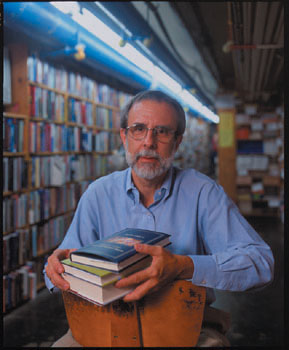 The
Seminary Co-op turns another page
The
Seminary Co-op turns another page
It
started simply-14 people pitching in $10 each to get 100 books
and a basement space. Over the years it has developed into one
of the University's most cherished assets, with 110,000 books
and 45,000 shareholders from more than 50 countries. On October
17 the Seminary Co-op Bookstore, on 58th Street and University
Avenue, turned 40.

As
one of the few remaining cooperative, independent, academic
bookstores, it is a member of an endangered species, struggling
to survive amid the multiplying corporate chains. But the Co-op,
bucking all prevailing bookstore trends-it doesn't serve coffee,
for instance-thrives. Why?
Longtime
manager Jack Cella attributes the store's success partially
to its passionately local focus. Its mission, unchanged from
its early days, is to serve the diverse reading needs of the
University and Hyde Park communities. Cella believes the store's
nearly iconic popularity among serious book lovers nationally
and internationally is merely a by-product of this local service.
"By serving Hyde Park's book needs," he says, "we've
become attractive to a certain type of person."
"I
think it's the best academic bookstore in the country, and I've
visited virtually every one of them," says Robert Pippin,
the Raymond W. and Martha Hilpert Gruner distinguished service
professor in the Committee on Social Thought and the College-and
a frequent Co-op customer. "If it's an important enough
book, the Co-op will have it."
Indeed
Cella is viewed by some as an arbiter of academia. When Wendy
Doniger, the Mircea Eliade professor in the Divinity School
and the College, saw that Cella had grouped history of religion
books with those in the anthropology section, she concluded
that "all our efforts to keep the two disciplines separate
had failed. If Jack saw that they were the same, they were the
same."
What's
more, adds Pippin, having the Co-op nearby is like having the
assistance of a trusted colleague. One challenge for academics
is trying to keep up with the flood of books being published
in their fields. In most cases this means sifting through an
ever-growing number of catalogs from publishers. The Co-op expedites
this process.
"Jack
and the staff know the faculty here. They have a real sense
of intelligence and taste, and they know good books," says
Pippin. "I can trust that if it's not on the front table
at the Co-op, it's probably not worth reading."
The
store's reputation in bookish circles has made it the envy of
academia. Cella was once courted by Columbia University provost
Jonathan Cole, who wanted him to open a similar bookstore in
Morningside Heights. He declined, but eventually two New Yorkers
created Labyrinth Books, an academic bookstore inspired by the
Co-op.
Yet
anyone who has visited the Co-op knows that its maze-like basement
setting is nearly inimitable-and that's part of its appeal.
"The maze is quite wonderful," says Doniger. "It's
mysterious. I sometimes wonder if someone will find a lost professor."
While
little of the interior has changed in the basement during the
past 40 years, the Seminary Co-op has grown. The bookstore added
57th Street Books and a Newberry Library branch, A. C. McClurg
Bookstore, as well as an online bookselling arm (www.semcoop.com).
Looking
beyond 40, Cella hopes to further improve the store. His wish
list includes more space-for books in other languages, for instance-and
a separate store exclusively for children's books. "People
are appreciative," says Cella of the Hyde Park patrons,
"but they're also demanding. We can always do better."
-Josh
Schonwald

![]()
 The
Seminary Co-op turns another page
The
Seminary Co-op turns another page